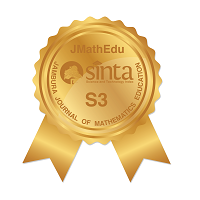The Effect of Motivation on Students's Mathematics Learning Outcomes in the New Normal Era
Abstract
Keywords
Full Text:
PDFReferences
Trianto, Mendesain model pembelajaran inovatif-progresif. Jakarta: Kencana Prenada Media Group, 2010.
A. Bishop, H. Tan, and T. N. Barkatsas, Diversity in mathematics education: Towards inclusive practices. Heidelberg: Springer, 2015.
R. Reys, M. M. Lindquist, D. V Lambdin, and N. L. Smith, Helping children learn mathematics, 9th ed. New York: John Wiley & Sons, Inc, 2009.
J. A. Van de Walle, Elementary and middle school mathematics: Teaching developmentally. Boston: Pearson Education, Inc, 2007.
S. F. Nissa and A. Haryanto, "Implementasi pembelajaran tatap muka di masa pandemi Covid-19" J. IKA Ikat. Alumni PGSD UNARS, vol. 8, no. 2, pp. 402-409, 2020, doi: https://doi.org/10.36841/pgsdunars.v8i2.840.
M. Tandi and M. Limbong, "Evaluasi hasil belajar siswa SMA Kristen Barana' pada pembelajaran tatap muka di masa new normal" J. Manaj. Pendidik., vol. 10, no. 1, pp. 13-20, 2021, doi: https://doi.org/10.33541/jmp.v10i1.3262.
H. Fitriani and A. Syarkowi, "Motivasi belajar siswa SMA pada pembelajaran Fisika di Era New Normal" J. Ilm. Pendidik. Fis., vol. 5, no. 3, pp. 448-458, 2021.
H. B. Uno, Teori motivasi dan pengukurannya. Jakarta: Bumi Aksara, 2013.
R. S. Peters, The concept of motivation, 2nd ed. New York: Taylor & Francis Group, 2015.
R. Bakar, "The effect of learning motivation on student's productive competencies in vocational high school, West Sumatra" Int. J. Asian Soc. Sci., vol. 4, no. 6, pp. 2226-5139, 2014.
B. Y. Dramanu and A. I. Mohammed, "Academic motivation and performance of junior high school students in Ghana" Eur. J. Educ. Dev. Psychol., vol. 5, no. 1, pp. 1-11, 2017.
L. J. Moleong and R. Natawijaya, Psikologi Pendidikan. Jakarta: Prindo Jaya, 1979.
L. Cohen, L. Manion, and K. Morrison, Research methods in education, 6th ed. New York: Routledge, 2007.
S. C. Shiu and S. Y. Lin, "The relationship between learning motivation and innovative behavior in the university students: From the perspective of creative self-efficacy" Int. J. Arts Sci., vol. 5, no. 5, pp. 33-38, 2012.
U. Phuntsho, "The impact of motivation on student's academic achievement and learning outcomes in mathematics - an action research" J. Educ. Action Res., vol. 1, no. 3, pp. 41-55, 2018, doi: 10.13140/RG.2.2.22064.46084/1.
A. Cahyani, I. D. Listiana, and S. P. D. Larasati, "Motivasi belajar siswa SMA pada pembelajaran daring di masa pandemi Covid-19" IQ (Ilmu Al-qur'an) J. Pendidik. Islam, vol. 3, no. 1, pp. 123-140, 2020, doi: https://doi.org/10.37542/iq.v3i01.57.
DOI: https://doi.org/10.34312/jmathedu.v3i2.15114
Refbacks
- There are currently no refbacks.
Copyright (c) 2022 Jambura Journal of Mathematics Education

This work is licensed under a Creative Commons Attribution-NonCommercial 4.0 International License.
Jambura Journal of Mathematics Education has been indexed by:
EDITORIAL OFFICE OF JAMBURA JOURNAL OF MATHEMATICS EDUCATION |
 | Department of Mathematics, Universitas Negeri Gorontalo Jl. Prof. Dr. Ing. B. J. Habibie, Moutong, Tilongkabila, Kabupaten Bone Bolango, Gorontalo 96554, Indonesia |
 | Email: [email protected] |
 | +6285255745923 (Call/SMS/WA) |
 | Jambura Journal of Mathematics Education (JMathEdu | eISSN: 2721-7477) by Department of Mathematics Universitas Negeri Gorontalo is licensed under a Creative Commons Attribution-NonCommercial 4.0 International License. Powered by Public Knowledge Project OJS. |




















